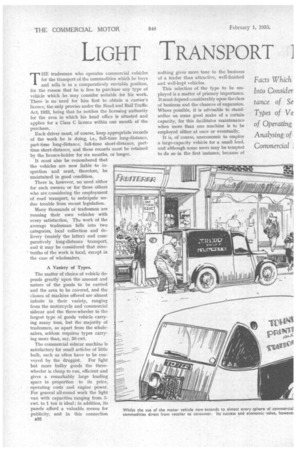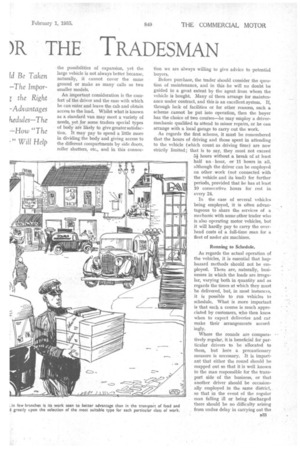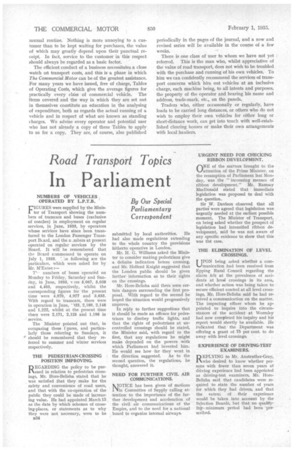LIGHT TRANSPORT )R THE TRADESMAN
Page 42

Page 43

Page 44

If you've noticed an error in this article please click here to report it so we can fix it.
THE tradesman who operates commercial vehicles for the transport of the commodities which he buys and sells is in a comparatively enviable position, ler the reason that he is free to purchase any type of vehicle which he may consider suitable for his work. There is no need for him first to obtain a carrier's licence, the only proviso under the Road and Rail Traffic Act, 1933, being that he notifies the licensing authority for the area in which his head office is situated and applies for a Class C licence within one month of the purchase.
Each driver must, of course, keep appropriate records of the work he is doing, i.e., full-time long-distance, part-time long-distance, full-time short-distance, parttime short-distance, and these records must be retained by the licence-holder for six months, or longer.
It must also be remembered that the vehicles are now liable to inspection and must, therefore, be maintained in good condition.
There is, however, no need either for such owners or for those others who are considering the employment of road transport, to anticipate undue trouble from recent legislation.
Many thousands of tradesmen are running their own vehicles with every satisfaction. The work of the average tradesman falls into two categories, local collection and delivery (mainly the latter) and comparatively long-distance transport, and it may be considered that ninetenths of the work is local, except in the case of wholesalers.
A Variety a Types.
The matter of choice of vehicle depends greatly upon the amount and nature of the goods to be carried and the area to be covered, and the classes of machine offered are almost infinite in their variety, ranging from the motorcycle and commercial sidecar and the three-wheeler to the largest type of goods vehicle carrying many tons, but the majority of tradesmen, as apart from the wholesalers, seldom requires types carrying more than, say, 30 cwt.
The commercial sidecar machine is satisfactory for small articles of little bulk, such as often have to be conveyed by the druggist. For light but more bulky goods the threewheeler is cheap to run, efficient and gives a remarkably large loading space in proportion to its price, operating costs and engine power. For general all-round work the light van with capacities ranging from 5cwt. to 1 ton is ideal; in addition, its panels afford a valuable means for publicity, and in this connection
a32 nothing gives more tone to the business of a trader than attractive, well-finished and well-kept vehicles.
This selection of the type to be employed is a matter of primary importance. It must depend considerably upon the class of business and the chances of expansion. Where possible, it is advisable to standardize on some good make of a certain capacity, for this facilitates maintenance when more than one machine is to be employed either at once or eventually.
It is, of course, uneconomic to employ a large-capacity vehicle for a small load, and although some users may be tempted to do so in the first instance, because of
the possibilities of expansion, yet the large vehicle is not always better because, naturally, it cannot cover the same ground or make as many calls as two smaller models.
An important consideration is the comfort of the driver and the ease with which he can enter and leave the cab and obtain access to the load. Whilst what is known as a standard van may meet a variety of needs, yet for some traders special types of body are likely to give greater satisfaction. It may pay to spend a little more in dividing the body and giving access to the different compartments by side doors, roller shutters, etc., and in this connec tion we are always willing to give advice to potential buyers.
Before purchase, the trader should consider the question of maintenance, and in this • he will no doubt be guided to a great extent by the agent from whom the vehicle is bought Many of them arrange for maintenance under contract, and this is an excellent-system. If, through lack of facilities or for other reasons, such a scheme cannot be put into operation, then the buyer has the choice of two coufses—he may employ a drivermechanic qualified to attend to minor repairs, or he can arrange with a local garage to carry out the work.
As regards the first scheme, it must be remembered that the hours of driving and those spent in attending to the vehicle (which count as driving time) are now strictly limited; that is to say, they must not exceed 51 hours without a break of at least half an hour, or 11 hours in all, although the driver can be employed on other-work (not connected with the vehicle and its load) for further periods,, provided that he has at least 10 consecutive hours for rest in every 24.
In the case of several vehicles being employed, it is often advan tageous to share the services of a mechanic with some other trader who is also operating motor vehicles, but it will hardly pay to carry the overhead costs of a full-time man for a fleet of under six machines.
Running to Schedule.
As regards the actual operation of the vehicles, it is essential that haphazard methods should not be employed. There are, naturally, businesses in which the loads are irregular, varying both in quantity and as regards the times at which they must be delivered, but, in most instances, it is possible to run vehicles to schedule. What is more important is that such a course is much appreciated by customers, who then know when to expect deliveries and car make their arrangements accord. ingly.
Where the rounds are comparatively regular, it is beneficial for particular drivers to be allocated to them, but here a precautionary measure is necessary. It is important that either the round should be mapped out so that it is well known to the man responsible for the transport side of the business, or that another driver should be occasionally employed in the same district, so that in the event of the regular man falling ill or being discharged there should be no difficulty arising from undue delay in carrying out the normal routine. Nothing is more annoying to a customer than to be kept waiting for purchases, the value of which may greatly depend upon their punctual receipt. In fact, service to the customer in this respect should always be regarded as a basic factor.
The efficient conduct of a business necessitates a close watch on transport costs, and this is a phase in which The Commercial Motor can be of the greatest assistance. For many years we have issued, free of charge, Tables of Operating Costs, which give the average figures for practically every class of commercial vehicle. The items covered and the way in which they are set out in themselves constitute an education in the analysing of expenditure, both as regards the actual running of a vehicle and in respect of what are known as standing charges. We advise every operator and potential user who has not already a copy of these Tables to apply to us for a copy. They are, of course, also published
periodically in the pages of the journal, and a new and revised series will be available in the course of a few weeks.
There is one class of user to whom we have not yet referred. This is the man who, whilst appreciative of the value of road transport, does not wish to be troubled with the purchase and running of his own vehicles. To him we can confidently recommend the services of transport concerns which hire out vehicles at an inclusive charge, each machine being, to all intents and purposes, the property of the operator and bearing his name and address, trade-mark, etc., on the panels.
Traders who, either occasionally or regularly, have loads to be carried Jong distances, or others who do not wish to employ their own vehicles for either long or short-distance work, can get into touch with well-established clearing houses or make their own arrangements with local hauliers.




















































































